| |||||
| Decades: | |||||
|---|---|---|---|---|---|
| See also: | Other events of 2010 List of years in Cameroon | ||||
Events from 2010 in Cameroon.
| |||||
| Decades: | |||||
|---|---|---|---|---|---|
| See also: | Other events of 2010 List of years in Cameroon | ||||
Events from 2010 in Cameroon.
| | This section needs expansion. You can help by adding to it. (July 2014) |
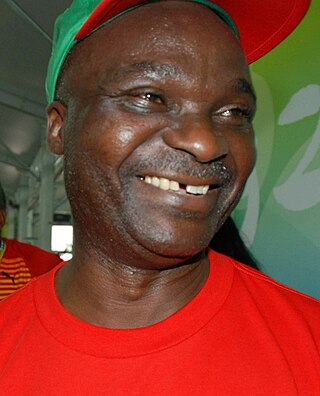
Albert Roger Miller, known as Roger Milla, is a Cameroonian former professional footballer who played as a forward. He was one of the first African players to be major stars on the international stage. He played in three World Cups for the Cameroon national team.
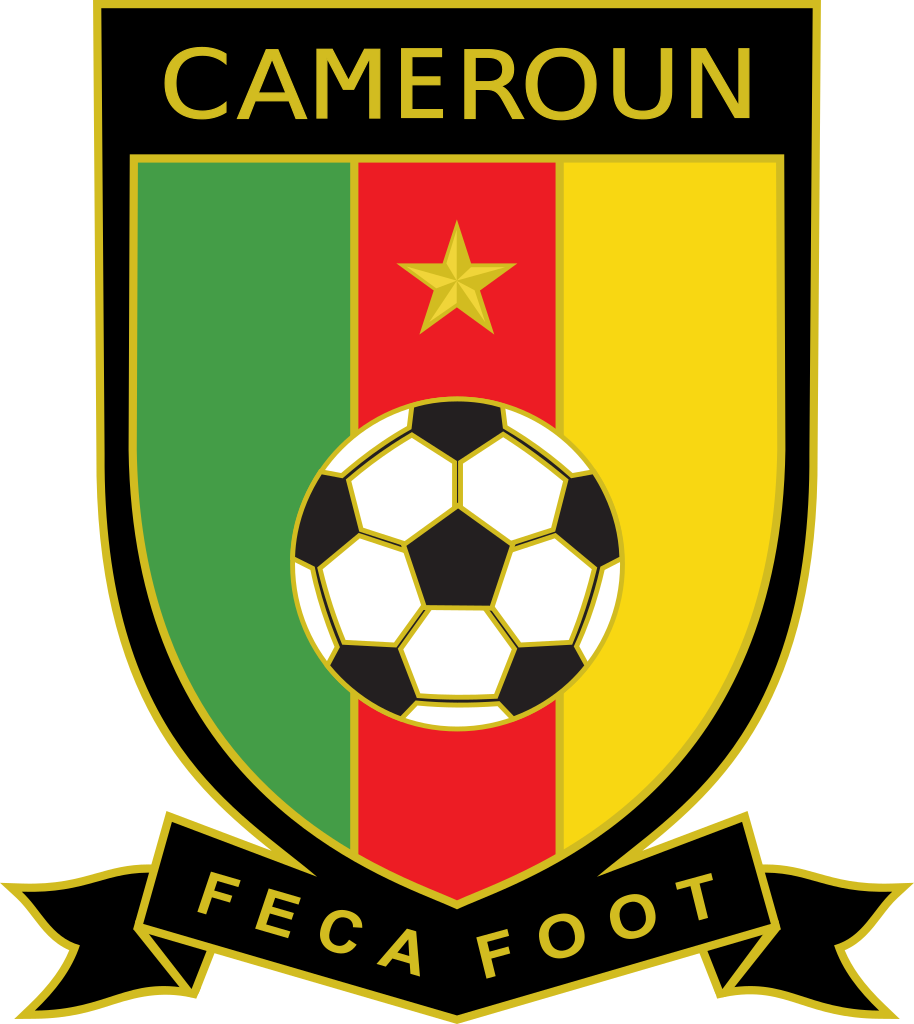
The Cameroon national football team, also known as the Indomitable Lions, represents Cameroon in men's international football. It is controlled by the Fédération Camerounaise de Football, a member of FIFA and its African confederation CAF.

The Nigeria national football team represents Nigeria in men's international football. Governed by the Nigeria Football Federation (NFF), they are three-time Africa Cup of Nations winners, with their most recent title in 2013. In April 1994, the Nigerian national football team was ranked 5th in the FIFA rankings, the highest FIFA ranking position ever achieved by an African football team. Throughout history, the team has qualified for six of the last eight FIFA World Cups, missing only the 2006 edition and 2022 edition. They have reached the round of 16 on three occasions. Their first World Cup appearance was the 1994 edition. The team represents FIFA and Confederation of African Football (CAF).

The Senegal national football team, nicknamed the Lions of Teranga, represents Senegal in international association football and is operated by the Senegalese Football Federation.

The Egypt national football team, known colloquially as "the Pharaohs", represents Egypt in men's international football, and is governed by the Egyptian Football Association (EFA), the governing body of football in Egypt. The team's historical stadium is Cairo International Stadium, although matches are sometimes played at Borg El Arab Stadium in Alexandria.

The Algeria national football team represents Algeria in men's international football and is governed by the Algerian Football Federation. The team plays their home matches at the 5 July Stadium in Algiers and Miloud Hadefi Stadium in Oran. Algeria joined FIFA on 1 January 1964, a year and a half after gaining independence. They are the current champions of the FIFA Arab Cup.

The Tunisia national football team represents Tunisia in men's international association football. The team is a member of both FIFA and CAF, the Confederation of African Football. It is governed by the Tunisian Football Federation, founded in 1957. Colloquially known as the Eagles of Carthage, the team's colours are red and white, and the bald eagle is its symbol. Most of Tunisia's home matches are played at the Stade Olympique de Radès in Radès since 2001. Jalel Kadri has been coaching the team since 30 January 2022.

The Ivory Coast national football team represents Ivory Coast in men's international football. Nicknamed the Elephants, the team is managed by the Ivorian Football Federation (FIF). Until 2005, their greatest accomplishment was winning the 1992 African Cup of Nations against Ghana on penalties at the Stade Léopold Sédar Senghor in Dakar, Senegal. Their second success came in 2015, again defeating Ghana on penalties in Bata, Equatorial Guinea. The team represents both FIFA and Confederation of African Football (CAF).

The Angola national football team represents Angola in men's international football and is controlled by the Angolan Football Federation. The team made its first appearance in 2006 FIFA World Cup, the team's nickname is Palancas Negras, The team is governing body of Football in Angola in the country, The team represents both FIFA and Confederation of African Football (CAF).

The Libya national football team represents Libya in men's international association football and it is controlled by the Libyan Football Federation. The team has never qualified for FIFA World Cups in history but has qualified for three Africa Cup of Nations: 1982, 2006, and 2012. In 1982, the team was both the host and runner-up. In the Arab Cup, Libya finished second in 1964 and 2012, and third in 1966. The team is affiliated with both FIFA and Confederation of African Football (CAF).
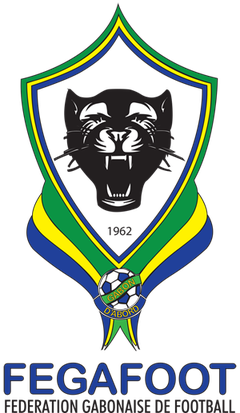
The Gabon national football team represents Gabon in men's international football. The team's nickname is The Panthers and it is governed by the Gabonese Football Federation. They have never qualified for the FIFA World Cup, but have qualified eight times for the Africa Cup of Nations. The team represents both FIFA and Confederation of African Football (CAF).

The Central African Republic national football team, nicknamed Les Fauves, is the national team of the Central African Republic and is controlled by the Central African Football Federation. They are a member of CAF. Despite being traditionally one of the weakest teams in Africa and the world, they recently achieved success. They won the 2009 CEMAC Cup by beating Gabon in the semi-finals and Equatorial Guinea in the final 3–0. Their FIFA ranking rose from 202nd in August 2010 to 89th by July 2011. On 10 October 2010, they earned a shock 2012 Africa Cup of Nations qualifier win at home against Algeria 2–0, which put them top of their qualification group. The team won its first FIFA World Cup qualifier on 2 June 2012 after beating Botswana 2–0 at home.
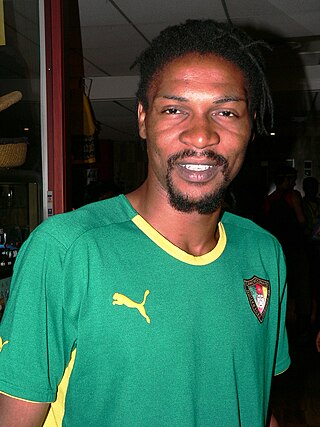
Rigobert Song Bahanag is a Cameroonian former professional footballer who is the manager of the Cameroon national team.

Geremi Sorele Njitap Fotso, known simply as Geremi, is a Cameroonian former footballer. He was a versatile player able to play at right back, right midfield or defensive midfielder, known for his power, pace, combative style and free-kick ability.
The Algeria women's national football team represents Algeria in international women's football. The team is currently ranked 76th in the world in the FIFA women's rankings. The team's highest ranking was 64th, in June 2009. The team plays its home games at the Stade du 5 Juillet in Algiers and is coached by Radia Fertoul since August 2018. Algeria played its first match on May 14, 1998, against France, and lost 14–0.

The Cameroon national women's football team, also known as the Indomitable Lionesses, is the national team of Cameroon and is controlled by the Cameroon Football Association. They finished second in the 1991, 2004, 2014, and 2016 Africa Women Cup of Nations, participated in the 2012 Olympic Games and have competed in their first ever FIFA Women's World Cup in 2015.

Issa Hayatou is a Cameroonian sports executive, former athlete and football administrator best known for serving as the president of the Confederation of African Football (CAF) between 1988 and 2017. He served as the acting FIFA president until 26 February 2016 as previous president Sepp Blatter was banned from all football-related activities in 2015 as a part of the that year's FIFA corruption investigation. In 2002, he ran for president of FIFA but was defeated by Blatter. He is also a member of the International Olympic Committee (IOC).

The most popular sport in Cameroon is football. The national team is traditionally one of the strongest teams on the African continent. They have participated in the World Cup 5 times, and in 1990 they reached the quarter-finals. It took extra time before England won the game 3–2. They have also won the African Cup of Nations 4 times as well as winning Olympic gold in Sydney in 2000. Among the most famous players are Roger Milla, Thomas N'Kono and Samuel Eto'o.
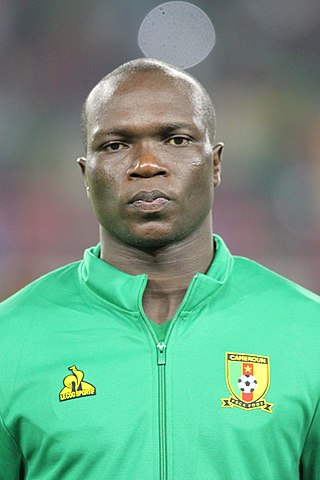
Vincent Aboubakar is a Cameroonian professional footballer who plays as a striker for Saudi Professional League club Al Nassr and captains the Cameroon national team.

The Angola women's national football team represents Angola in international women's football and it is controlled by the Angolan Football Federation. Their best place on the FIFA Rankings was the 82nd place, in December 2003. The only tournaments that they qualified were the 1995 and 2002 African Women's Championships, and their best finish was as Semi-Finalists in the 1995 tournament. Angola has, in contrast to many other African countries, has never suffered a heavy defeat. They have seldom lost by more than two goals.